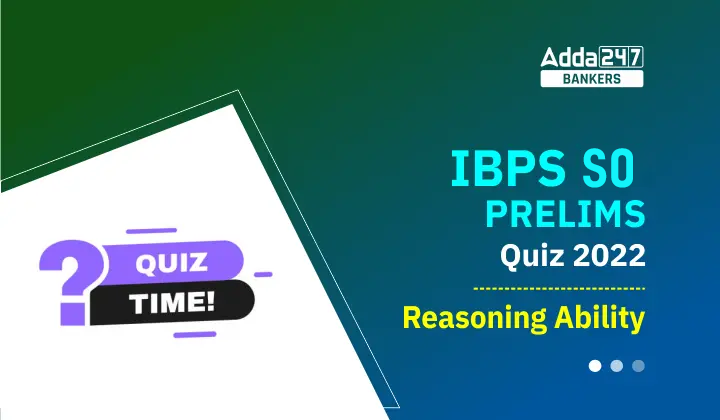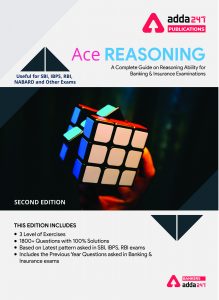Direction (1-5): In this question, relationship between different elements is shown in the statements. The statements are followed by conclusions. Study the conclusions based on the given statement and select the appropriate answer.
Q1. Statements: A≥B=Q≤P<J≤Y; Z≥A>X; A<M
Conclusions: I. B<Y II. X≥J
(a) Only conclusion I is true.
(b) Neither conclusion I nor II is true.
(c) Only conclusion II is true.
(d) Both conclusions I and conclusion II are true.
(e) Either conclusion I or II is true.
Q2. Statements: M>A≥B=Q; Z≥A>X; Q≤P<J≤Y
Conclusions: I. Z=Q II. Z>Q
(a) Only conclusion I is true.
(b) Neither conclusion I nor II is true.
(c) Only conclusion II is true.
(d) Both conclusion I and conclusion II are true.
(e) Either conclusion I or II is true.
Q3. Statements: T<R; X<G<R=A≤S
Conclusions: I. G<S II. S>T
(a) Only conclusion I is true.
(b) Neither conclusion I nor II is true.
(c) Only conclusion II is true.
(d) Both conclusions I and conclusion II are true.
(e) Either conclusion I or II is true.
Q4. Statements: M<K≤I>N; D≥P; I≥C; P=U<M
Conclusions: I. M<C II. N>U
(a) Only conclusion I is true.
(b) Neither conclusion I nor II is true.
(c) Only conclusion II is true.
(d) Both conclusions I and conclusion II are true.
(e) Either conclusion I or II is true.
Q5. Statements: P=U<M<K≤I>N; D≥P; I≥C
Conclusions: I. D≥K II. I>P
(a) Only conclusion I is true.
(b) Neither conclusion I nor II is true.
(c) Only conclusion II is true.
(d) Both conclusions I and conclusion II are true.
(e) Either conclusion I or II is true.
Directions (6-8): Study the given information and answer the following question.
Eight pillars are arranged in a ground in a certain way. A is 20m east of B. G is 15m west of D. H is 5m east of C which is 5m north of F. E is 16m south of G. D is 8m north of A. E is 10m east of F.
Q6. What is the shortest distance between A and E?
(a) 18m
(b) 15m
(c) 17m
(d) 21m
(e) 22m
Q7. Pillar A is in which direction with respect to H?
(a) North-East
(b) South-East
(c) East
(d) North-West
(e) South-West
Q8. What is the shortest distance between Pillar B and Pillar C?
(a) 6m
(b) 5m
(c) √35m
(d) 37m
(e) None of these
Directions (9-10): Study the following information carefully and answer the question given below-
There are eight members in a family i.e., K, O, L, N, Q, M, P and S. Among them three are married couples. S is the daughter of the one who is L’s nephew. Q is the daughter-in-law of the one who is grandfather of M. O has only one grandson. P is grand-daughter-in-law of K. L is O’s husband’s sister.
Q9. How many children P’s father-in-law has?
(a) Two
(b) One
(c) Three
(d) Four
(e) None of these
Q10. Who among the following is father of N?
(a) O
(b) L
(c) K
(d) M
(e) None of these
Directions (11-12): In each of the questions below, some statements are given followed by conclusions/group of conclusions numbered I and II. You have to assume all the statements to be true even if they seem to be at variance from the commonly known facts and then decide which of the given two conclusions logically follows from the information given in the statements.
(a) If only conclusion I follows
(b) If only conclusion II follows
(c) If either I or II follows
(d) If neither I nor II follows
(e) If both I and II follow
Q11. Statements: No Glitter is Bracelet
All Locket are Bracelet
Some locket are Ring
Conclusions: I: Some Ring are not glitter
II: No locket is glitter
Q12. Statements: All Ball are Cat
Only a few Ball are Apple
Some Eagle are Cat
Conclusions: I: Some Cat are Apple
II: All Eagle are Ball is a possibility
Directions (13-15): Study the following information carefully and answer the given questions. In a certain code language,
‘Temperature sun summer rise’ is coded as ‘% @ # $’
‘Sun Pollution seasonal summer’ is coded as ‘# $ ~ >’
‘Temperature summer warmer Pollution’ is coded as ‘? ~ # @’
Q13. What may be the code of ‘World Temperature’?
(a) @ #
(b) @ >
(c) @ ?
(d) @ *
(e) @ ~
Q14. Which of the following code is coded for ‘Pollution’?
(a) @
(b) ~
(c) $
(d) ?
(e) None of these
Q15. What will be the code of ‘seasonal green’?
(a) > ?
(b) ? @
(c) > $
(d) @ >
(e) None of these
Solutions






 General Awareness Quiz for Bank Mains Ex...
General Awareness Quiz for Bank Mains Ex...
 English Language Quiz For Bank Foundatio...
English Language Quiz For Bank Foundatio...
 Reasoning Quiz For Bank Foundation 2024 ...
Reasoning Quiz For Bank Foundation 2024 ...




